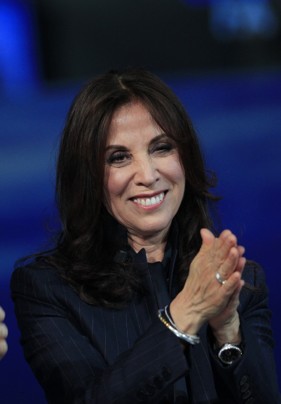|
To accompany director Martin Scorsese's documentary on George
Harrison, "Living in the Material World," Harrison's widow Olivia teamed up with Giles Martin -- son of legendary Beatles
producer George Martin -- to curate Early Takes: Volume 1, a complation songs that go hand in hand with the film.
The two scoured the former Beatle's archives for 18 months, searching for the most appropriate way to represent his
artistic growth. In honor of the album and film's DVD release, Olivia and Giles chat with Spinner about working with
an iconic director, the process of combing Harrison's vast musical output and their future plans for his unreleased songs.

Was it challenging trying to pick out songs for the doc?
How involved were you?
Giles: We would sit in Friar Park and go through tapes and run-throughs. It's an interesting
process. It's filtered by osmosis. Olivia had tapes and tapes of material, and we would go down to Friar Park and listen to
these tapes. We would filter things based on whether they showed George off, finding the right sort of sound for various things.
Then we would send them forward to Martin, and he would listen. He was making the film, so it was like a mediation process.
Then when it came to the end, we realized we had these great tracks. We had these great performances that were so real that
we decided to put just a limited number of this material we'd found onto a CD, just so we could reflect the feel of the documentary.
The demos seem a lot more folk and acoustic-based,
with a Dylan influence. Were you going for that feel?
Olivia: Yeah. I think George was going for a more raw feel.
Those were the early takes. If you hear "My Sweet Lord," it says "take one." Marty was interested in the creative process
of writing a song, although I don't think he would ever show a first cut of a movie. That's interesting, isn't it? We never
thought of that.
Did he have any sort of process when he was writing songs?
Olivia: It was such
an amazing thing to witness that process. It was just being born right then and there. I'd try not to interrupt; I'd put a
pencil and a piece of paper by him, you know, just to make sure he had something if he wanted to write something down. I'd
get the tape cassette player and put it there. With these early takes, for me anyway, I'm experiencing that this was the birth
of something. Uncluttered, unproduced, unfettered, not too thought-out -- just that purity. That's the only reason for putting
them out. I think they're really beautiful and intimate and revealing.
I think once or twice, he tried to write with people,
and he just didn't know how to do that. It's work. A writer goes to work in the morning, and you just start writing, and you
have to write every morning. He wasn't like that with songwriting. Although he could work at it, with George, it was more
like, "Uh oh, here it comes." It would just come from somewhere, and something would trigger it. It could be a bird singing
outside. It could be some sound from nature, but you could just see: "Here it comes." I don't think he had quite so much control
over it, but he knew how to tap into it. I think that's why he was quiet, in a sense. He wasn't really the quiet one, but
he had a quietude to him. I think that was why, because if you're still, you have more chance to make yourself available to
whatever that is. I think that was his process.
How much unreleased music do you have and will it ever
see the light of day?
Olivia: There is some more material. There may be a minute of something he was writing,
and it will never be finished. I had an idea of giving unfinished songs to different people. Giving one to Paul [McCartney],
maybe, or giving one to somebody else and saying, "Here are the bones of a song, would you like to finish it?" I think that
would be a nice idea.
I think that would be a great idea.
Olivia: Yeah, because they're so beautiful.
There are such beautiful riffs. I could just put them on a loop. You know, Giles, "Plaza 93000," I love that riff. It just
goes on and on.
Did George have a master archive of tapes that you go through, or do you go through them chronologically?
I imagine it must be a massive store of material.
Olivia: A massive mess. We just grabbed a box every day.
Giles:
It's funny, it works in different ways. There is an organized store, which was great. We didn't listen to everything. You
kind of know what it's going to be. You see a master final mix of something, and you know what it is. But we'd work through
everything, and then Olivia would turn up with a box of cassettes or a box of reel-to-reels that were found in a cupboard.
So just when we thought we were getting on top of things, a new wave would appear. Which is great. Part of the job is to listen
and to organize and to put things into place, not even for us but for what goes on in the future. It's one of those things
where to organize your own creations is really, really hard. It's much easier to have it done, and it's a huge privilege being
part of that.
While you were going through the tapes, did anything surprise you more than anything else?
Giles:
There were lots of things that surprised me; you are surprised in both ways. I was surprised when I heard "My Sweet Lord"
done like that. I was so used to "My Sweet Lord" being a completely different rhythm and different feel. To suddenly have
it as a three-piece with George singing live and playing acoustic guitar, and it's got a groove to it, it's just different,
and its kind of cool. There are great surprises. Then there would be days where you would find a tape box, and it would have
a list of great names on it, and it would just be a recording of people having cups of tea. So there were surprises on both
levels. You'd find a gem and you'd also find a radio play on a tape.
In the documentary, George talks about how when he first
heard the Wall of Sound that Phil Spector was putting on his songs, he really didn't like it. Why do you think he chose to continue with Spector, given
the raw nature of the demos?
Giles: Well that was "Wah Wah" he was talking about when he came in and didn't like
the mix. There's an interesting thing that happens in the studio, as well, where at some stage, you have to let go slightly,
and then you take it back. George was so consumed with his writing; he didn't throw away words, and everything was so considered.
He knew where everything should be. Then to do that on acoustic guitar on your own, there is that step you have to make where
you step over the abyss, and you realize you're making a song that's going to go out there. That initial reaction. Then you
suddenly realize it's gone from a sketch to a painting. That initial jump is always a tough one, but its kind of comforting
in the same way, at times.
A lot of musicians were coming through Friar Park. Was there any one over the course
of his life that became a real touchstone for him?
Olivia: There were a lot of people. Roy Orbison, for instance,
appeared in his life in 1966, maybe '65 -- toured with Roy Orbison. Then there he is again in 1987 singing with him in the
studio here. Little Richard, Buddy Holly and of course people who he came to know, like Bob Dylan, who he truly admired. That
was a touchstone and a benchmark for storytelling. He really loved Bob's songs. In one of the small videos we did, George
was talking about Bob and said he was the only one who was saying anything. Like, "It's rush hour now/on the wheel and the
plow/and the sun is going down upon the sacred cow." That's saying something. He really listened to Bob's lyrics and his poetry.
Speaking
of Bob and Roy, did he ever compare working in the Traveling Wilburys to his experience in the Beatles? Both were supergroups
of a sort, with just massive amounts of talent in each.
Olivia: They certainly were, weren't there? What were
there, five Wilburies and four Beatles? Yeah, those were nine incredibly talented people. No, he never did. He just said he
had a lot of fun with the Wilburys, and he had a lot of fun with the Beatles. He never really ... I don't think there's anything
you can compare to being in a band like the Beatles, is there? But he really had fun with Bob and Roy and Tom [Petty] and
Jeff [Lynne]. He loved being a collaborator and loved not having to do all the work himself. I think that was the main thing.
And he could hang out; he liked to hang out. He didn't always have guys and musicians to hang out with. He missed that.
Most
of the songs on All Things Must Pass were holdovers from George's Beatles days. Was he ever frustrated at being stifled
as a writer as a part of the band, or was he glad that it resulted in pretty much a fully formed solo album?
Olivia:
Well, he wasn't stifled as a writer. Nobody can stifle you as a writer. You can just keep writing; you might not get your
song on an album. He developed later as a songwriter. It seems to be history that he was suppressed or something, but really,
he developed later as a songwriter. Although there was so much material that John [Lennon] and Paul were writing, sure, it
would be hard to get your songs on an album when they had been writing so many songs for all those years. When we look back
on it, we say "All those years?" But Giles, how many years was it? Five years?
G: Yeah.
O: It wasn't 20 years. It seemed
like 20 years. I think everything happened perfectly at the right time for George.
With this documentary do
you feel like you've gotten everything off your chest, and you are closing a chapter, or is this the tip of the iceberg?
Olivia:
We did go into and really this is it. I don't think there is any more I could express in a film or a documentary about George
than Marty has managed to express with "Living in the Material World." But having said that, there is some music that possibly
will come out, some more early tapes, demos, nice things, nice performances of George. But really, this is it. This is a bookend.
This was the last thing on George's list. He had a list, and this was it. As Dhani said, "You're off the hook, mom."
|




